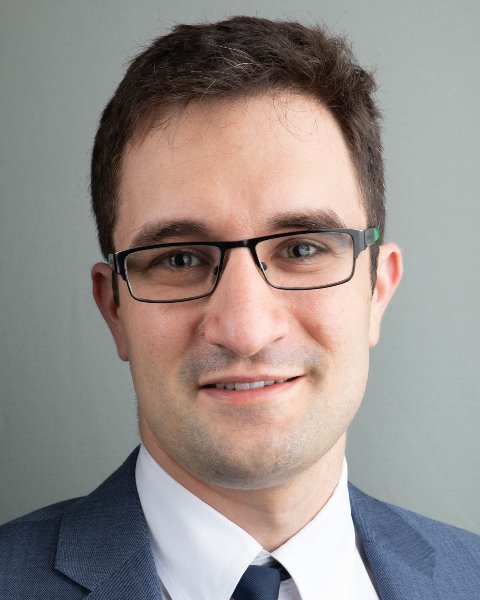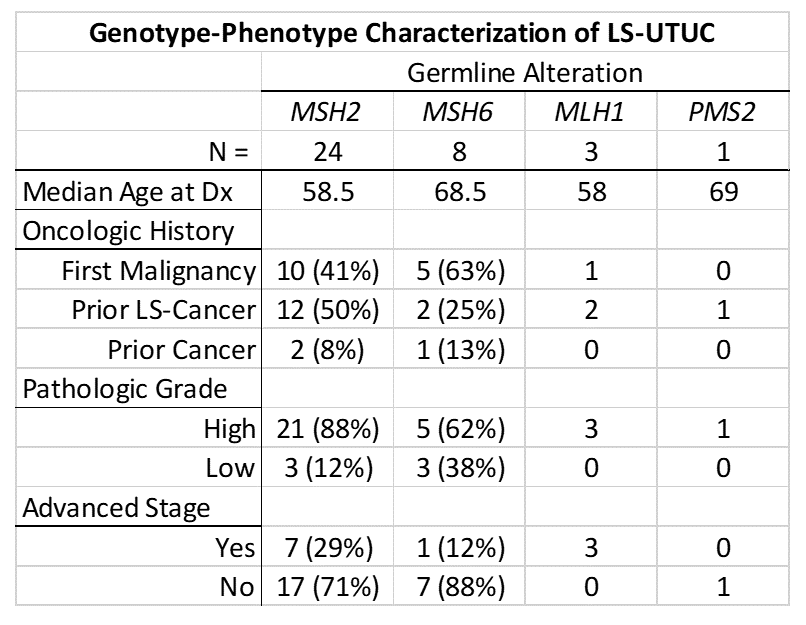Back
Poster, Podium & Video Sessions
Podium
PD15: Kidney Cancer: Epidemiology & Evaluation/Staging/Surveillance I
PD15-04: Genotype-Phenotype Characterization of Lynch Syndrome Associated Upper Tract Urothelial Carcinoma (UTUC).
Friday, May 13, 2022
4:00 PM – 4:10 PM
Location: Room 245
Craig Labbate*, Donika Saporito, Mehrad Adibi, Maureen Mork, Eduardo Vilar Sanchez, Bogdan Czerniak, Charles Guo, Eric Jonasch, Surena Matin, Houston, TX

Craig Labbate, MD
Urologic Oncology Fellow
UT MD Anderson Cancer Center
Podium Presenter(s)
Introduction: Lynch Syndrome (LS) is a hereditary cancer predisposition syndrome characterized by germline mutation in mismatch repair (MMR) genes and may represent up to 5% of all diagnosed UTUC. We sought to characterize the phenotype of patients with LS-UTUC by their germline MMR mutation.
Methods: We performed a retrospective review of a prospective database of patients with UTUC. Patients with Lynch Syndrome were screened by family history and/or tumor immunohistochemistry (protein loss of MLH2, MSH2, MSH6 and PMS2), or were part of a universal genetic testing program. All patients underwent confirmatory germline genetic testing in a CLIA certified laboratory. Microsatellite instability (MSI) was tested by PCR at 7 microsatellite markers. Advanced disease was defined as =(y)pT3 disease, clinical node positivity or metastatic disease at presentation.
Results: 36 patients with germline-confirmed Lynch Syndrome were identified between 2006 and 2021. In 16 patients (44%), UTUC was the index LS-associated malignancy. Germline pathogenic alterations in MSH2 were seen in 24 (67% patients, MSH6 in 8 (22%) patients, MLH1 in 3 (8%) and PMS2 in 2 (6%). 1 patient had alteration in MSH2 and PMS2. IHC testing was performed on 21 samples of which 3 (14%) had intact expression of MMR proteins despite germline alteration. Patients with MSH2 alteration were more likely to be diagnosed at younger age (60 years) than MSH6 (72 years), Advanced pathology was present in 7/24 (29%) MSH2 patients, 1/8 (12%) MSH6 patients, 3/3 MLH1 patients, and 0/1 PMS2 patients. Ten of 11 (89%) patients tested for MSI were microsatellite unstable (MSI-H). One patient with MSH6 alteration was microsatellite stable. Low grade pathology, while rare (6/36), was enriched in patients with MSH6 alterations (3/8) compared to MSH2 (3/24).
Conclusions: Alterations within MSH2 was the most common germline amongst patients with LS-UTUC and associated with early diagnosis, and microsatellite instability.Early data indicate patients with MSH6 alterations are more likely to be diagnosed at later age with lower risk disease and without prior LS-associated cancers. These findings are the subject of ongoing universal germline LS testing at our center.
Source of Funding: Eleanore and Scott Petty Fund for UTUC Research
Pam and Jim Harris UTUC Lynch Syndrome Screening Fund

Methods: We performed a retrospective review of a prospective database of patients with UTUC. Patients with Lynch Syndrome were screened by family history and/or tumor immunohistochemistry (protein loss of MLH2, MSH2, MSH6 and PMS2), or were part of a universal genetic testing program. All patients underwent confirmatory germline genetic testing in a CLIA certified laboratory. Microsatellite instability (MSI) was tested by PCR at 7 microsatellite markers. Advanced disease was defined as =(y)pT3 disease, clinical node positivity or metastatic disease at presentation.
Results: 36 patients with germline-confirmed Lynch Syndrome were identified between 2006 and 2021. In 16 patients (44%), UTUC was the index LS-associated malignancy. Germline pathogenic alterations in MSH2 were seen in 24 (67% patients, MSH6 in 8 (22%) patients, MLH1 in 3 (8%) and PMS2 in 2 (6%). 1 patient had alteration in MSH2 and PMS2. IHC testing was performed on 21 samples of which 3 (14%) had intact expression of MMR proteins despite germline alteration. Patients with MSH2 alteration were more likely to be diagnosed at younger age (60 years) than MSH6 (72 years), Advanced pathology was present in 7/24 (29%) MSH2 patients, 1/8 (12%) MSH6 patients, 3/3 MLH1 patients, and 0/1 PMS2 patients. Ten of 11 (89%) patients tested for MSI were microsatellite unstable (MSI-H). One patient with MSH6 alteration was microsatellite stable. Low grade pathology, while rare (6/36), was enriched in patients with MSH6 alterations (3/8) compared to MSH2 (3/24).
Conclusions: Alterations within MSH2 was the most common germline amongst patients with LS-UTUC and associated with early diagnosis, and microsatellite instability.Early data indicate patients with MSH6 alterations are more likely to be diagnosed at later age with lower risk disease and without prior LS-associated cancers. These findings are the subject of ongoing universal germline LS testing at our center.
Source of Funding: Eleanore and Scott Petty Fund for UTUC Research
Pam and Jim Harris UTUC Lynch Syndrome Screening Fund


.jpg)
.jpg)